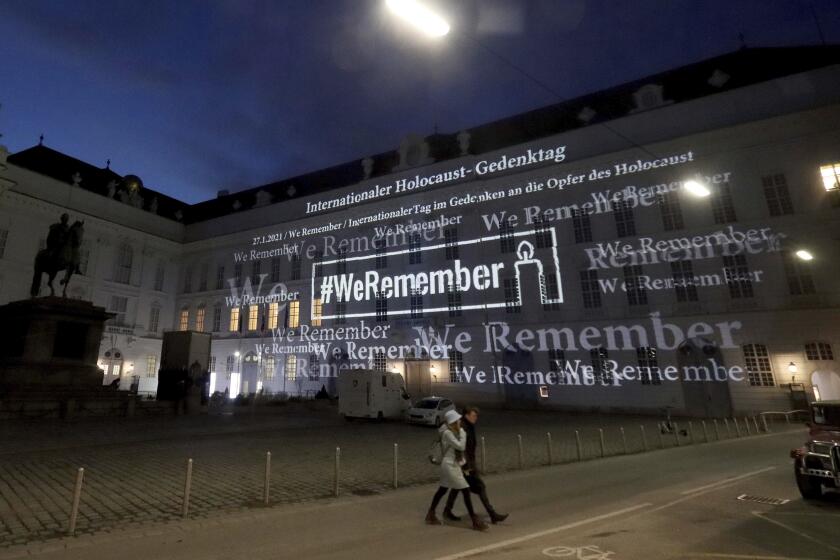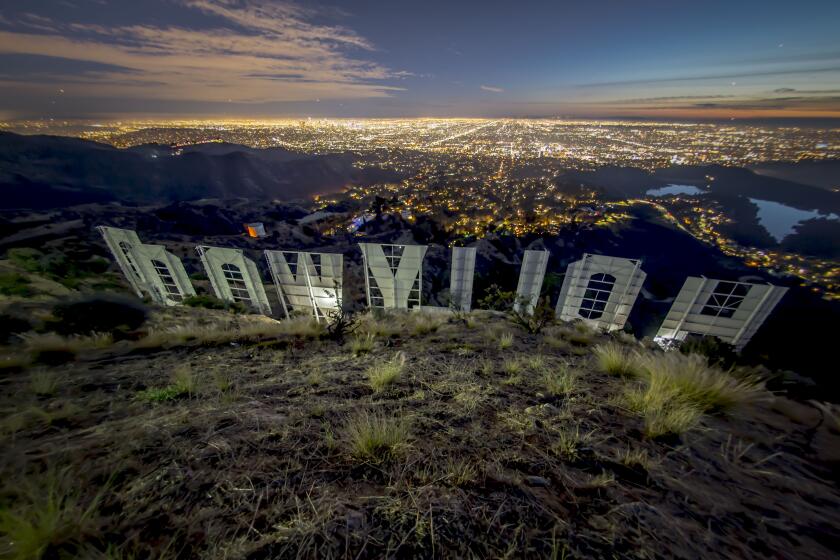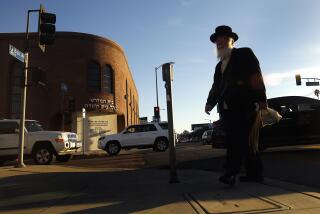Opinion: My magical, small-town neighborhood in ‘Jewish L.A.’

I went on a walk one Saturday afternoon in my Los Angeles neighborhood with a friend, and as we saw many people leaving a synagogue he asked me why there was a security guard outside bidding congregants goodbye.
“What do you mean?” I asked my friend, who is not Jewish. “Churches don’t have security guards?”
He told me they usually didn’t.
It was only later that I realized why I still felt comfortable in my neighborhood, Pico-Robertson, even though such security measures can be unnerving to others.
A guard at the synagogue can’t remind people of antisemitism if they are always aware of it. For me, it has always been a fact of life. I don’t remember the first time I learned about the Holocaust or about antisemitic microaggressions. I don’t remember when I realized that my name announces my religion or that wearing a Star of David necklace might invite more trouble than it’s worth.
I feel fortunate to be a voice for the millions of victims who were killed by the Nazi regime. But it is the duty of every one of us to keep the memory of the Holocaust alive.
Even though both my high school and a university I attended here were spray-painted with antisemitic slurs and I’ve heard remarks about my last name when I’ve picked up take-out, I have always felt relatively safe living in my part of Jewish L.A.
I was asked recently in a meeting to describe where I live in Los Angeles.
“It’s a little magical,” I said. “It kind of feels like you traveled back in time. I don’t really feel like a minority when I’m here.”
While I love traveling, and sometimes dream of getting a cute apartment in another part of the city, I’ve never really wanted to live outside of Los Angeles. And, when I envision my future, I see myself returning often to this area where I grew up.
My neighborhood still has a sense of identity that many others have lost. It does sometimes feel like I arrived here via DeLorean. I’m 23 and have lived in Los Angeles my whole life, and yet sometimes when I walk around Pico-Robertson I’m still a little awestruck by the signs in three languages (Hebrew, Arabic and English), the synagogues and traditional yeshiva and Jewish day schools dotting the streets, and foods such as bourekas, sabich and other kosher delicacies that I can get at stores here, but rarely see in other parts of the city.
I had the unexpected chance to show a young Ukrainian woman some Hollywood sites she had only known from movies. Studio heads hold the dreams of millions in their hands.
When I was describing my neighborhood, I mentioned that it felt like the shtetl — a village in the old country. I can easily slip into Hebrew with the shopkeepers, and I can walk to the synagogue that I attend most Saturdays. At the bakery, someone recognizes me from temple. At Starbucks, I see my fifth-grade teacher from my Jewish day school.
This all reminds me of when a friend bemoaned dating in her small town and then quickly told me that she supposed it wasn’t all that different from dating in my neighborhood. I told her she wasn’t exactly wrong, that the people I meet inevitably know someone I went to school with, if not a family member.
I saw a post online recently that read “pretty girls have that one necklace that they never take off.” I immediately looked down at the pendant I’ve worn every day since my high school graduation. I have never felt uncomfortable wearing this Hebrew charm because of that feeling of the shtetl.
Growing up in a neighborhood with a majority Jewish population in such a diverse city has given me an incredible confidence in my culture.
While L.A. is the second-largest city in the U.S., to me, it is also a small town. Can that be a bit suffocating? Yes. Does it often feel like everyone knows my parents, my uncles and aunts, my entire life story? A little bit. But I wouldn’t give up that tight-knit community aspect of my part of L.A for anything.
There is diversity here too, in the people, in the ways we observe Judaism, in opinion about what is happening in the Middle East. But as antisemitism continues to rise, and at a time when my name feels like it can make me a target, there’s comfort and solidarity to being part of this neighborhood.
Earlier this year, I went to New York City for work. While I’d been there before, this time I could see an alternate version of myself who had abandoned canyon roads for subway grates and swapped the beach for Broadway. But, as quickly as the thought came, I dismissed it. Los Angeles and Pico-Robertson have my heart.
After all, where else will everyone agree that the kosher Ralphs shouldn’t have closed?
Rachel Bernstein is a writer in Los Angeles.
More to Read
A cure for the common opinion
Get thought-provoking perspectives with our weekly newsletter.
You may occasionally receive promotional content from the Los Angeles Times.












